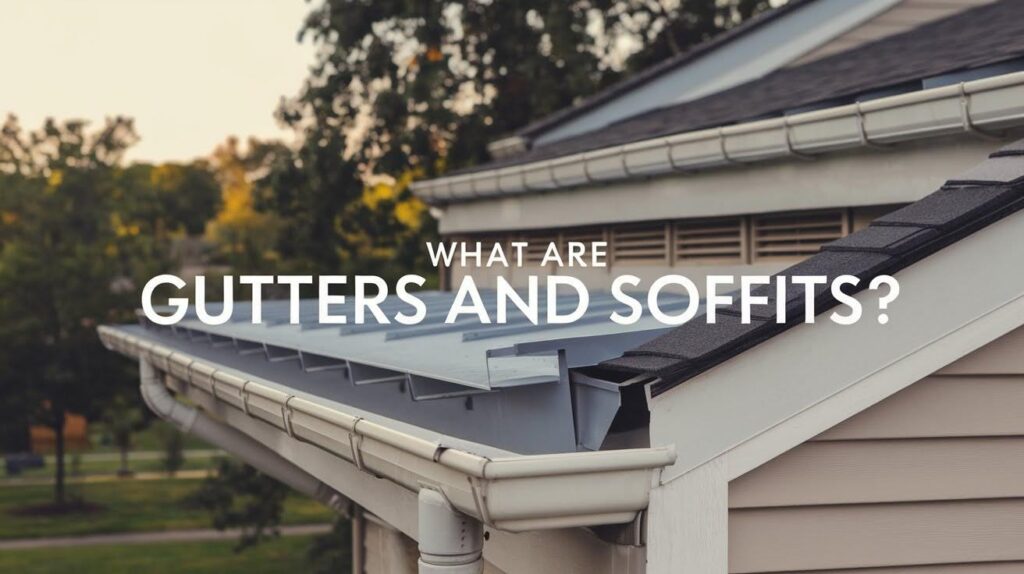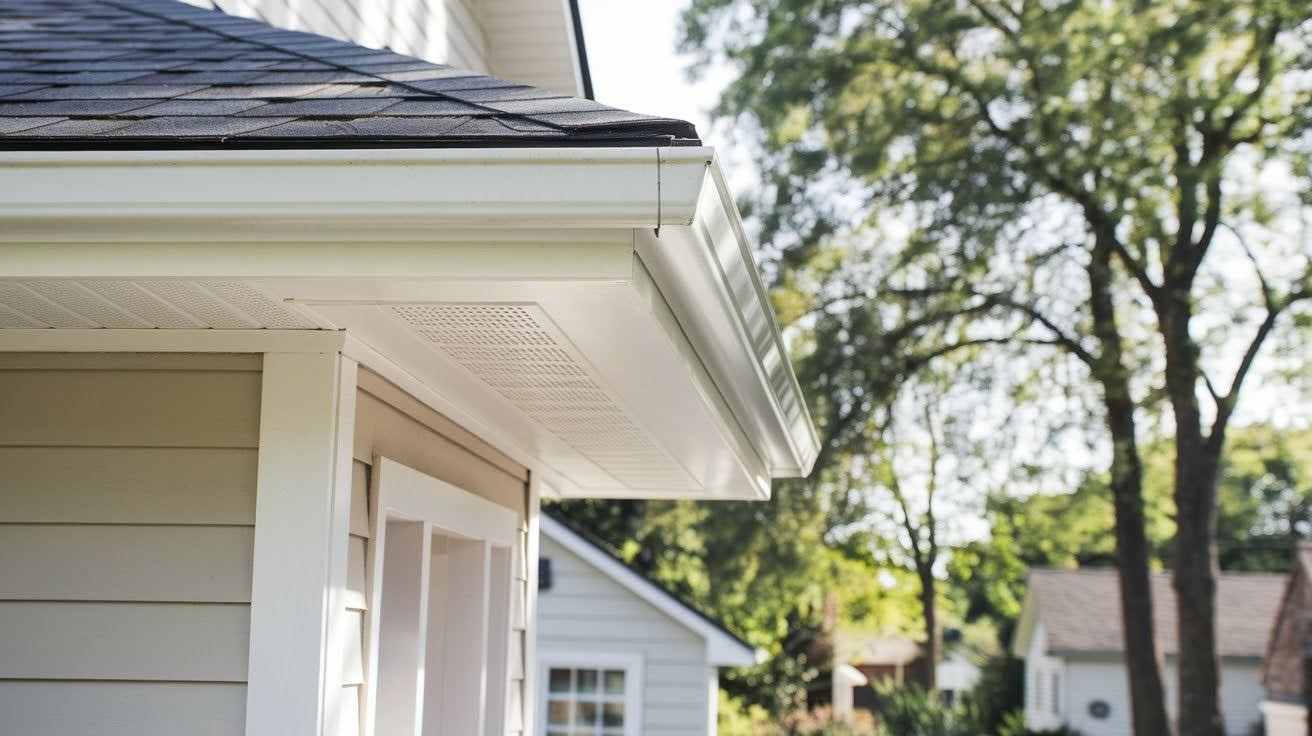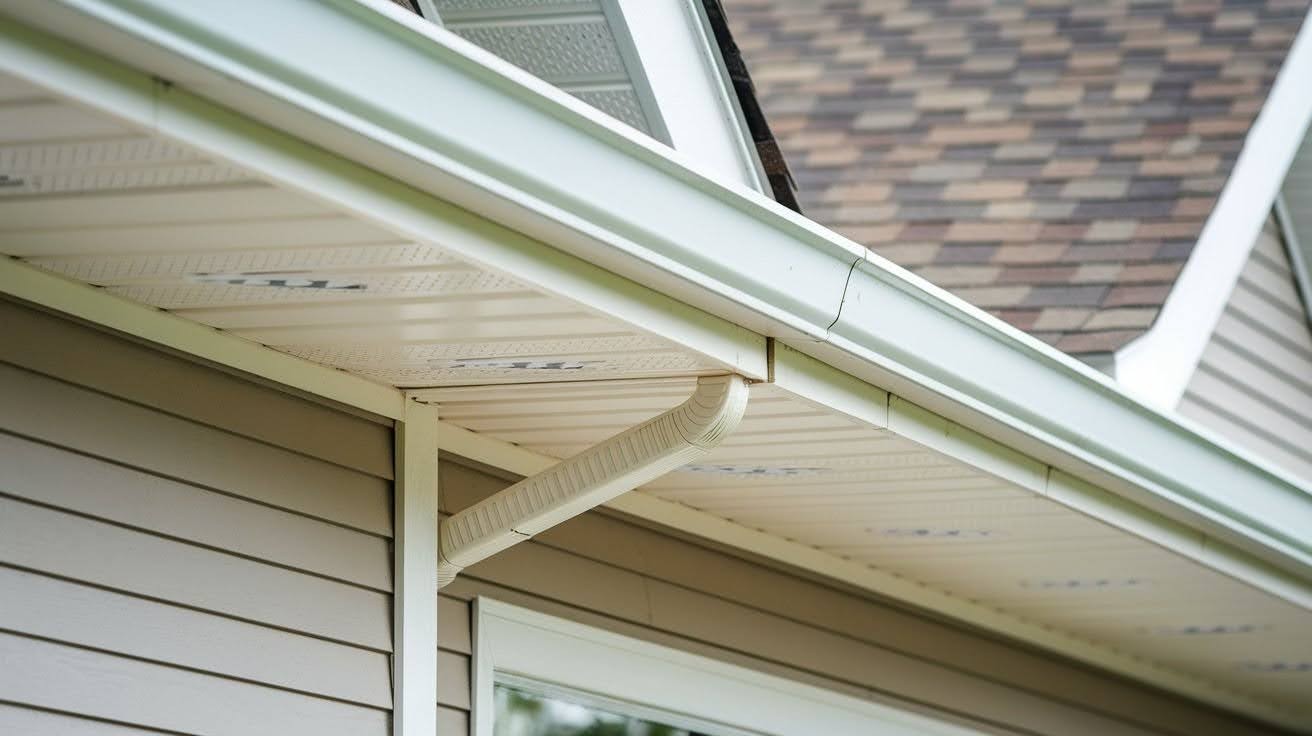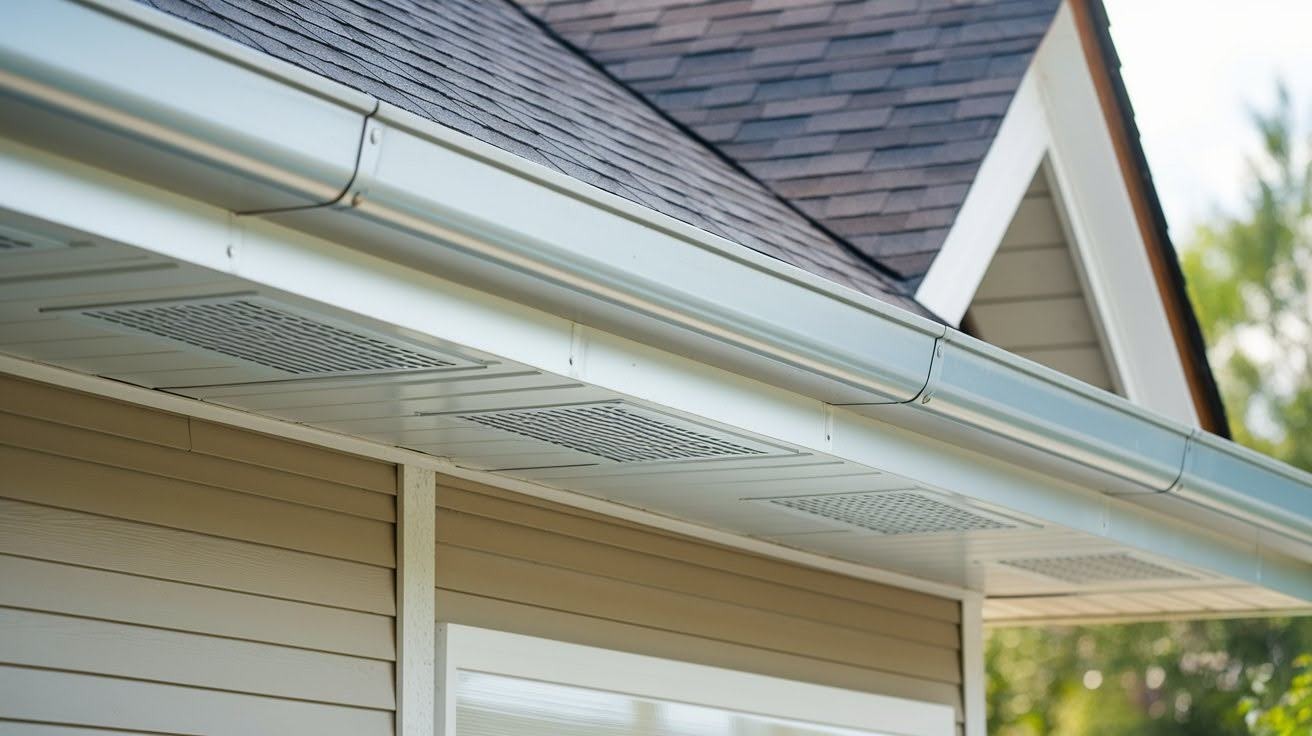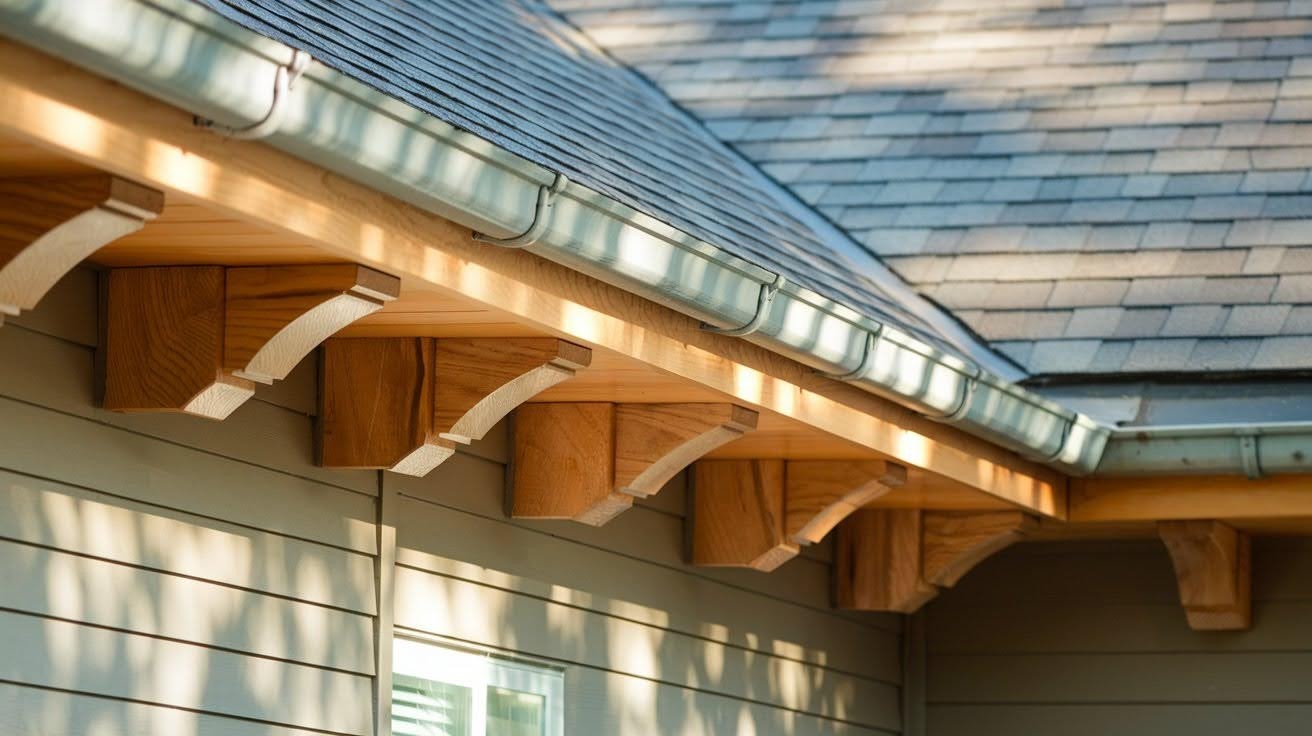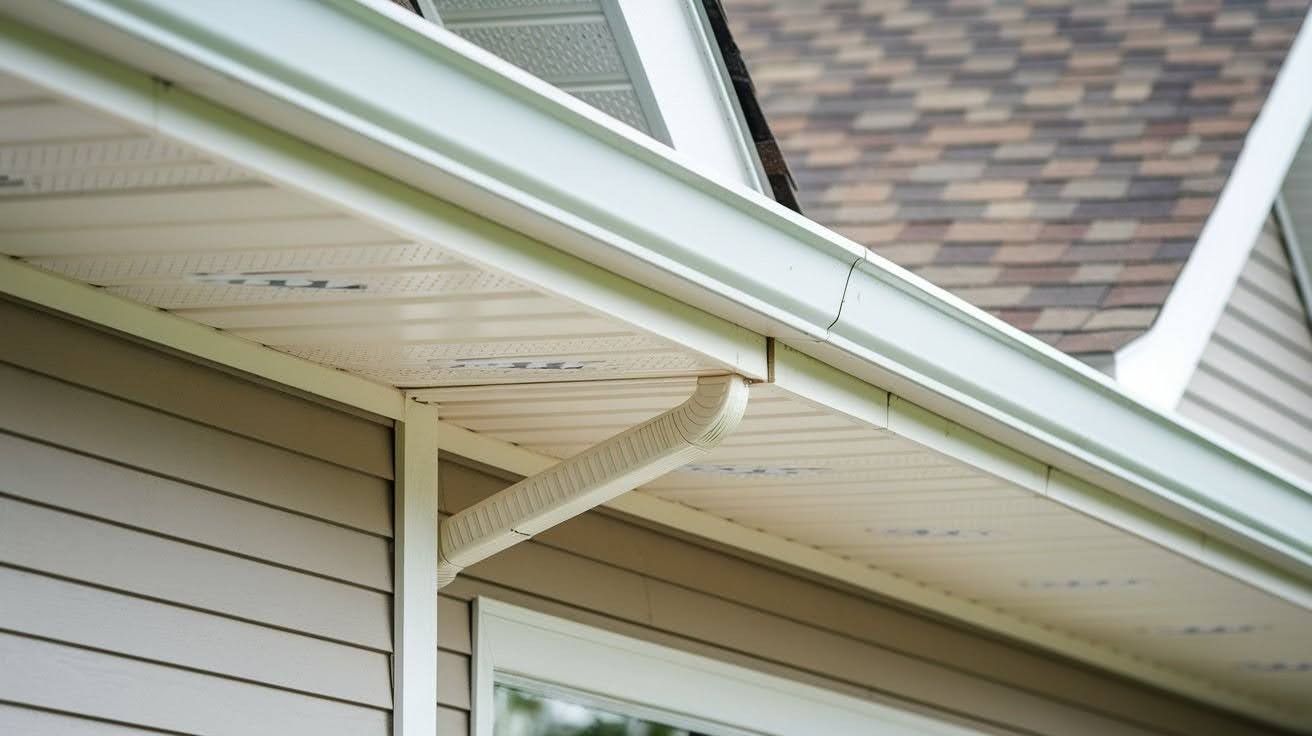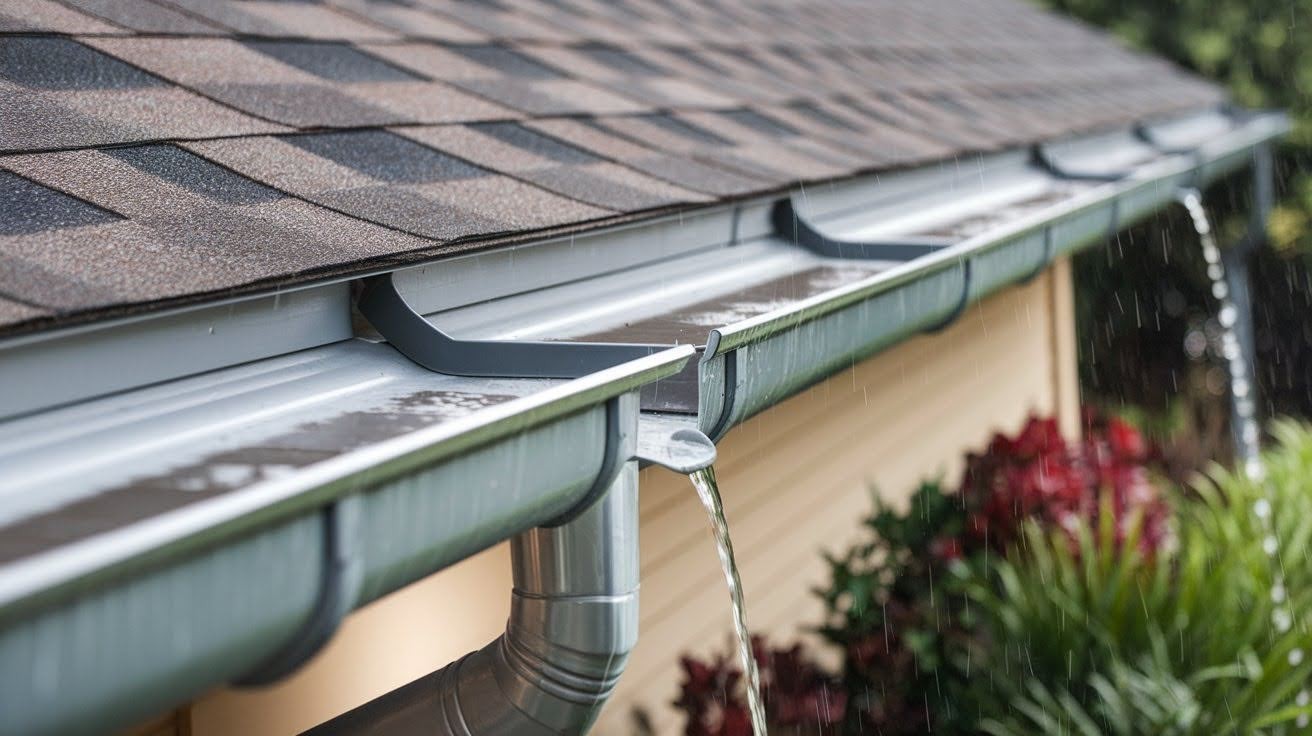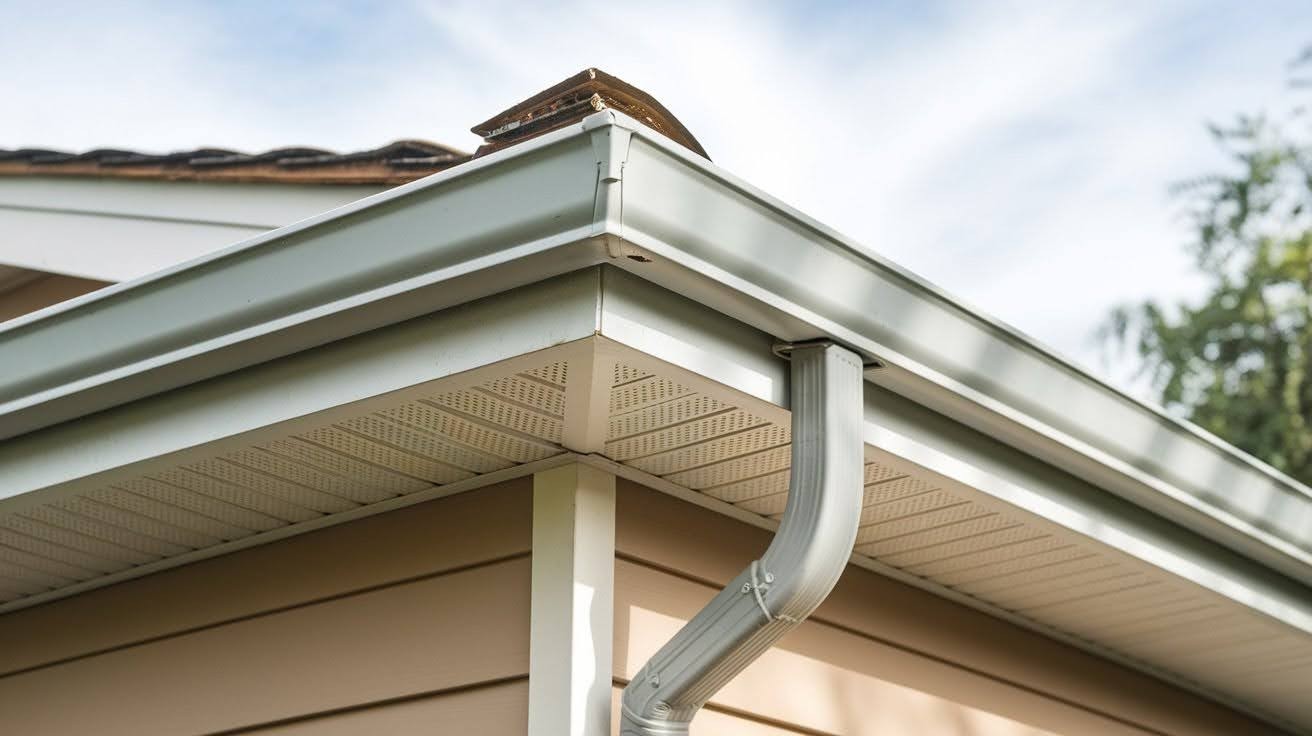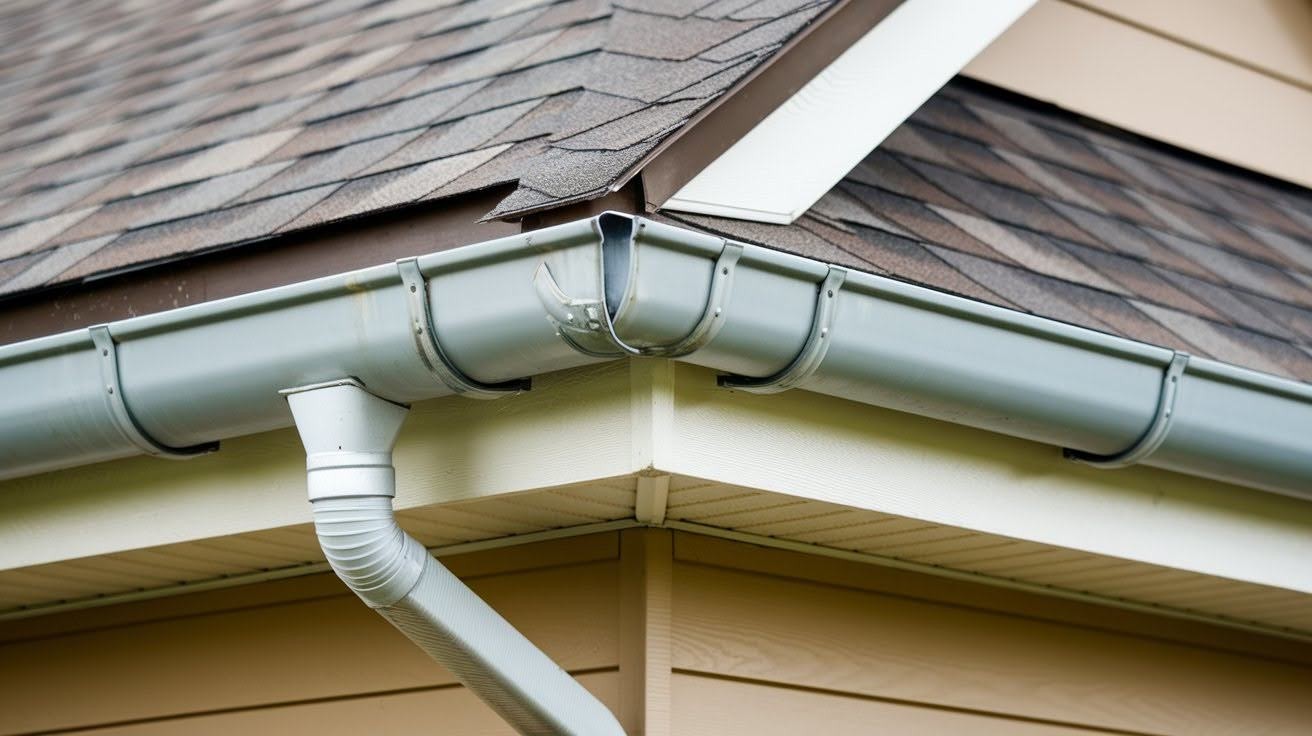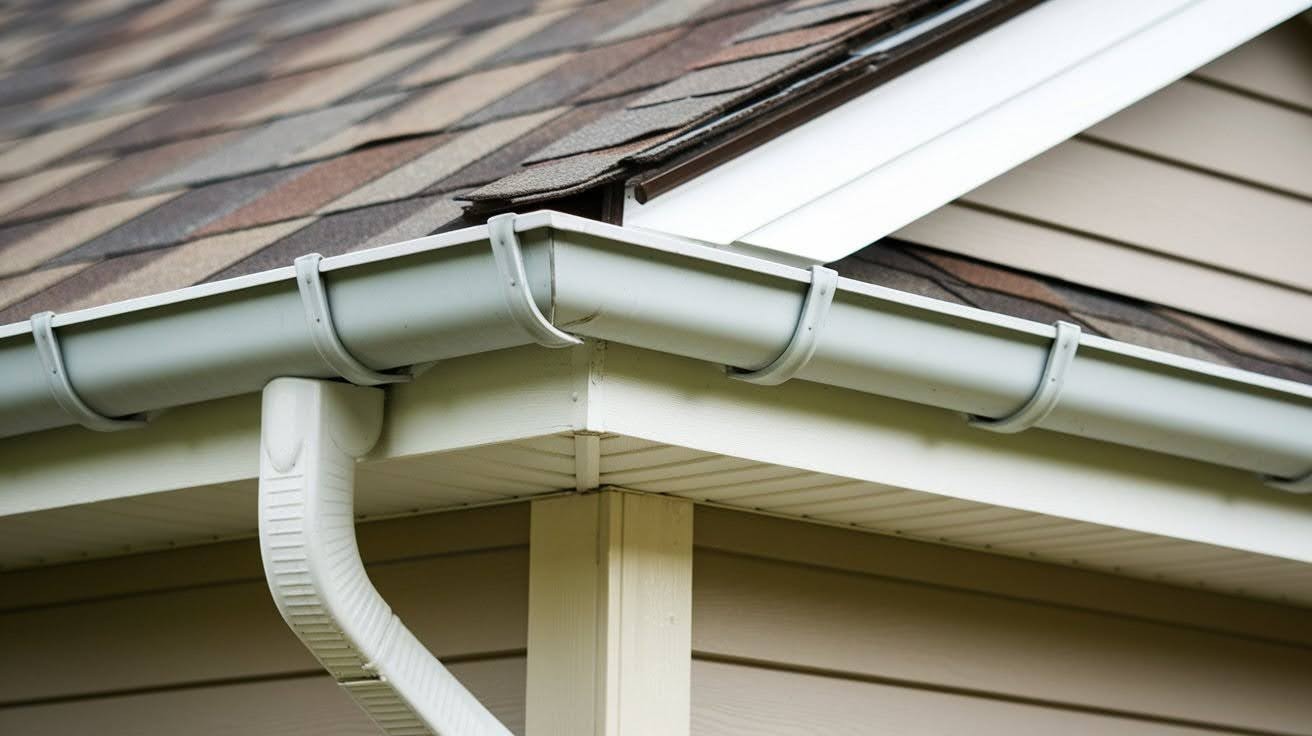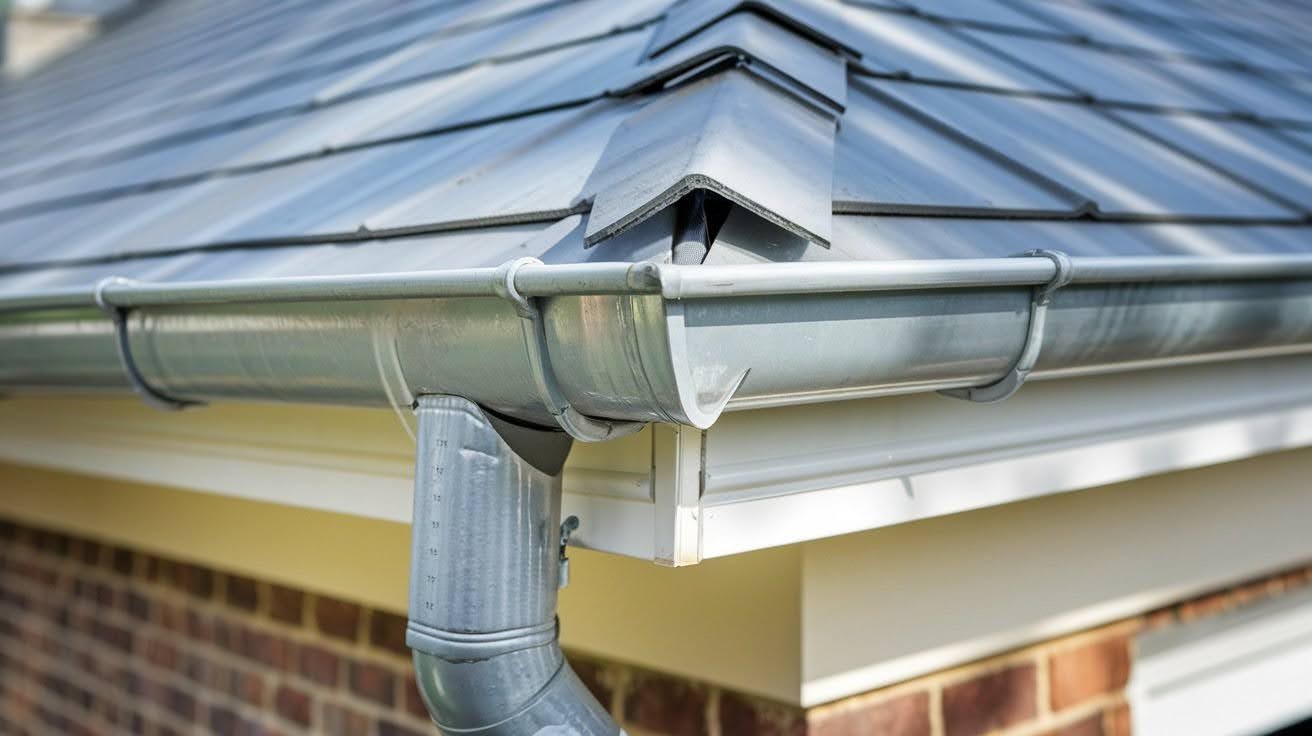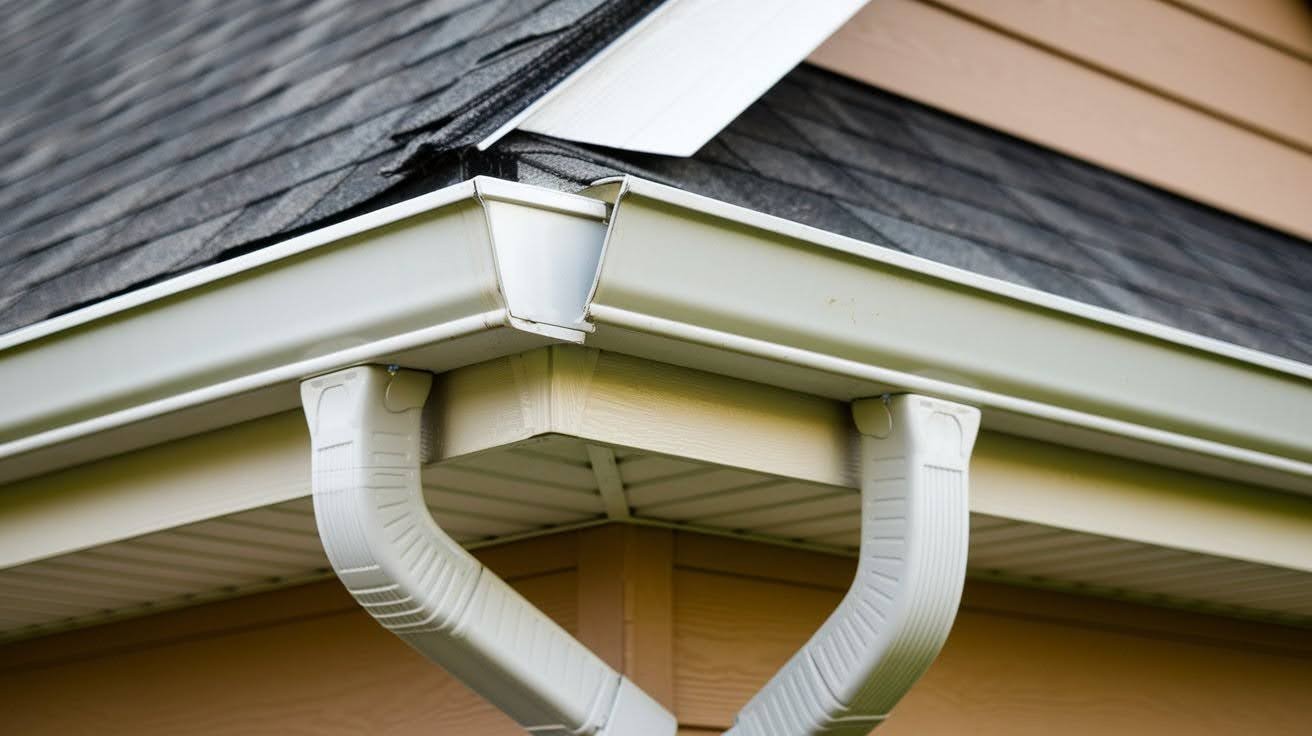Your home’s gutters and soffits work quietly behind the scenes, but they’re absolutely crucial for keeping your house safe and looking great. I know these components might not seem exciting, but trust me, understanding them can save you thousands in repairs down the road.
Gutters channel rainwater away from your foundation, while soffits provide proper ventilation for your attic and give your roofline a clean, finished appearance. When these systems fail, you’re looking at potential water damage, pest problems, and costly structural issues.
I’ve helped countless homeowners tackle gutter and soffit challenges, and I’m here to share everything you need to know. This article will show you how these systems protect your investment, when they need attention, and how to keep them working perfectly.
Ready to become your home’s best advocate? Let’s get started.
Understanding Soffits
Here’s everything you need to know about these overlooked but vital parts of your home’s exterior.
What Is A Soffit?
A soffit is the exposed surface beneath the overhanging section of your roof eave. Think of it as the ceiling under your roof’s overhang. You’ll find soffits running along the sides of your house, right where your roof meets your walls.
Most people walk past them daily without giving them a second thought. But I promise you, they’re working hard to keep your home healthy.
Why Are Soffits Important?
Ventilation and airflow in the attic
Your attic needs to breathe, and soffits make that possible. They pull cool air up from outside while your ridge vents push hot air out the top. This creates a natural flow that keeps your attic temperature balanced.
Soffits act like a shield for your roof’s wooden framework. Rain, snow, and wind can’t reach those expensive rafters when soffits are doing their job right.
Types Of Soffits
Vinyl Soffits
Budget-friendly and low maintenance. They resist moisture and won’t rot, but they can crack in extreme cold.
Aluminum Soffits
Durable and fire-resistant. They last decades but can dent from hail or falling branches.
Wooden Soffits
Classic look that matches many home styles. They need regular painting and can rot if not maintained properly.
Fiber Cement Soffits
The premium choice. They resist fire, insects, and rot. Higher upfront cost but minimal long-term maintenance.
Pros And Cons Of Different Soffit Materials
Let me break down each material so you can make the right choice for your home and budget.
| Material | Pros | Cons |
| Vinyl | Low cost, no painting needed, moisture resistant, easy installation | Can crack in freezing weather, limited color options, may fade over time |
| Aluminum | Fire resistant, lightweight, won’t rot, long-lasting | Dents easily, can corrode near salt water, expansion issues in heat |
| Wood | Natural beauty, paintable, matches traditional homes, easy to work with | Needs regular maintenance, prone to rot and insects, higher upkeep costs |
| Fiber Cement | Fire proof, insect resistant, extremely durable, minimal maintenance | Higher upfront cost, heavier installation, requires special tools to cut |
Here’s what I tell my clients: vinyl works great for most homes on a budget. Aluminum is your best bet if you live in a fire-prone area.
Wood looks amazing but only choose it if you’re committed to maintenance. And fiber cement? It’s worth the extra cost if you plan to stay in your home long-term.
The wrong choice costs you money later. The right choice protects your investment for decades.
Which material fits your situation best?
Understanding Gutters
Here’s your complete guide to these hardworking water management systems that protect your home.
What Are Gutters?
Gutters are metal or plastic channels that run along your roof’s edge. They catch rainwater as it runs off your roof and direct it through downspouts away from your house.
Think of them as your home’s plumbing system for rainwater. Simple concept, huge impact on your property’s health.
Why Do Homes Need Gutters?
Directing rainwater away from the foundation
Water pooling around your foundation causes cracks and settlement issues. Gutters grab that water and send it far from your house’s base.
No gutters means thousands in foundation repairs later.
Preventing basement flooding and erosion
I’ve seen too many flooded basements from missing or broken gutters. When water can’t flow away properly, it finds the path of least resistance. Usually straight into your basement.
Protecting siding and landscaping
Rain without gutters creates waterfalls off your roof. This constant water flow stains your siding and washes away your garden beds. Your landscaping investment literally goes down the drain.
Types Of Gutters
K-Style Gutters
The most popular choice. They look like crown molding and hold more water than other styles. Perfect for most residential applications.
Half-Round Gutters
Classic curved design that complements older homes. They’re easier to clean but hold less water during heavy storms.
Box Gutters
Built into the roof structure itself. Common on commercial buildings and some historic homes. They’re hidden but harder to maintain.
Common Gutter Materials
Aluminum is the best all-around choice for its 20+ year lifespan, rust resistance, and affordability, while copper offers premium 50+ year durability for upscale homes.
Aluminum
Lightweight, rust-resistant, and affordable. They’ll last 20+ years with basic care. Most contractors recommend them for good reason.
Vinyl
The budget option that works well in moderate climates. Cold weather makes them brittle, so skip these if you live up north.
Copper
Premium choice that develops a beautiful patina over time. They cost more upfront but last 50+ years. Perfect for upscale homes.
Steel
Strong and durable but prone to rust. Galvanized steel costs less than aluminum but requires more maintenance to prevent corrosion.
Pros And Cons Of Each Gutter Material
Here’s the honest breakdown of what each material brings to your home and wallet.
| Material | Pros | Cons |
| Aluminum | Lightweight, won’t rust, affordable, easy installation, 20+ year lifespan | Can dent from hail, expands in heat, limited color choices |
| Vinyl | Lowest cost, never rusts, DIY-friendly, comes in many colors | Cracks in cold weather, fades in sun, shorter 10-15 year lifespan |
| Copper | Lasts 50+ years, beautiful patina finish, increases home value, won’t rust | Very expensive upfront, requires skilled installation, can stain nearby surfaces |
| Steel | Extremely strong, handles heavy snow loads, paintable surface | Rusts over time, heavier installation, needs regular maintenance |
I always tell homeowners this: aluminum hits the sweet spot for most situations. It balances cost, durability, and performance better than other options.
Vinyl works if you’re on a tight budget and live somewhere warm. But honestly? The money you save upfront gets eaten up by replacements.
Copper is gorgeous and worth every penny if you can afford it. Your great-grandkids will thank you.
Steel makes sense in areas with extreme weather, but prepare for ongoing rust prevention work.
What’s your priority: upfront savings or long-term value?
Quick Gutter & Soffit Maintenance & Care Tips
Safety: Sturdy ladder, have a spotter, avoid windy days
Cleaning: Hand-remove debris, flush with hose, clean twice yearly (spring/fall)
Repairs: Seal small holes with roofing cement, snake clogs at downspouts, patch large holes
Inspection: Check for dark spots/sagging on soffits, poke wood to test for rot, listen for animal sounds
Seasonal:
- Spring: Clean debris, check ice damage
- Summer: Remove wasp nests, touch up paint
- Fall: Clear all leaves, secure loose gutters
- Winter: Watch for ice dams, clear snow
Key Warning: Water overflow in light rain = serious clog
Bottom Line: Regular maintenance prevents expensive replacements
Conclusion
Your gutters and soffits might not grab attention like a fresh paint job, but they’re absolutely vital for protecting your home. These systems work together to manage water, provide ventilation, and keep your house structurally sound for decades.
When choosing materials, consider your climate, budget, and long-term plans. Aluminum gutters and vinyl soffits work well for most homeowners. If you’re planning to stay put, invest in premium options like copper gutters or fiber cement soffits.
Remember, proactive maintenance beats costly repairs every time. Clean your gutters twice yearly, inspect your soffits regularly, and address small issues before they become big problems.
Your home is your biggest investment. Give it the protection it deserves with properly functioning gutters and soffits. Start today, and enjoy peace of mind for years to come.
Frequently Asked Questions
How Often Should I Clean My Gutters?
Clean your gutters twice a year, typically in spring and fall. If you have many trees around your home, you might need to clean them more frequently to prevent clogs and overflow issues.
What’s The Average Lifespan Of Gutters And Soffits?
Aluminum gutters last 20-25 years, while vinyl gutters need replacement every 10-15 years. Soffits typically last 20-30 years depending on material, with fiber cement lasting the longest and requiring minimal maintenance.
Can I Install Gutters And Soffits Myself?
Basic gutter installation is possible for DIY enthusiasts, but soffits require more skill and safety precautions. I recommend hiring professionals for complex installations or if you’re uncomfortable working at height for extended periods.
How Do I Know If My Soffits Need Ventilation?
Look for small holes or vents along your soffit panels. If you don’t see any, your attic likely lacks proper airflow, which can lead to moisture problems and higher energy bills.
What Causes Gutters To Pull Away From The House?
Heavy debris buildup, ice dams, or loose fasteners cause gutters to separate from your home. Regular cleaning and prompt repairs prevent this costly problem from developing into major structural damage.

